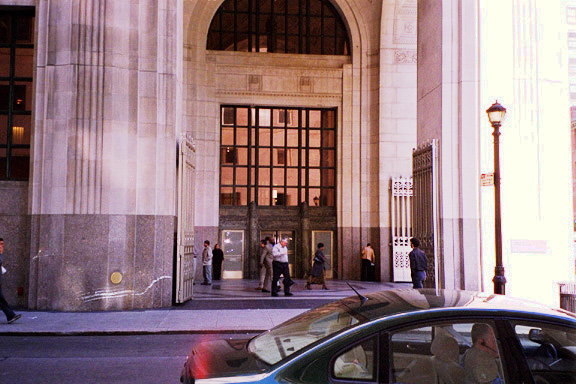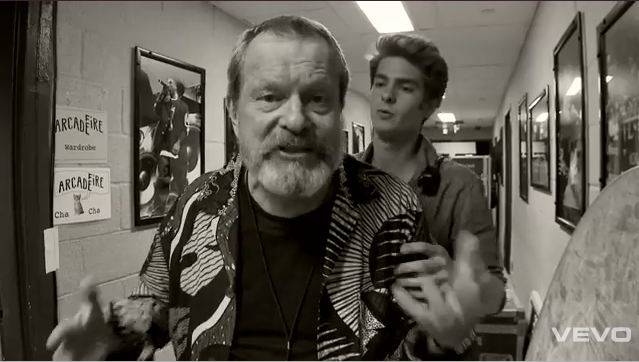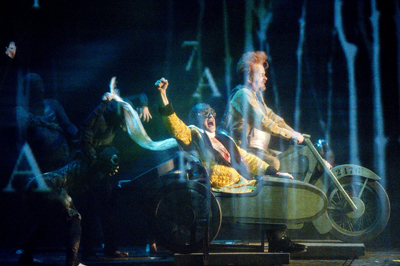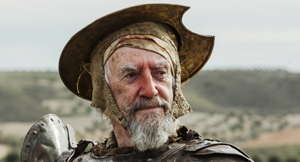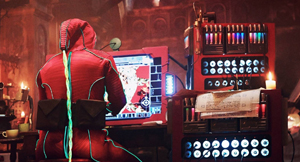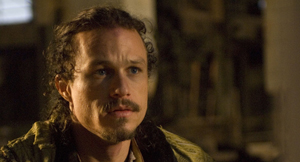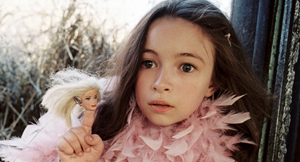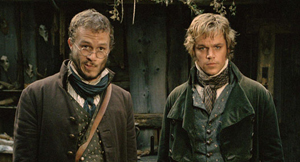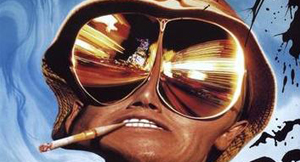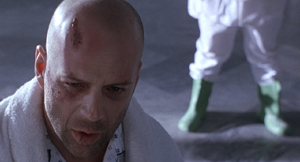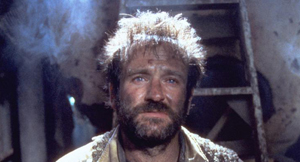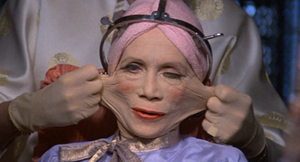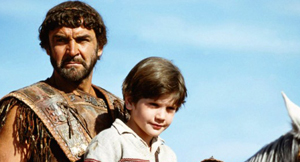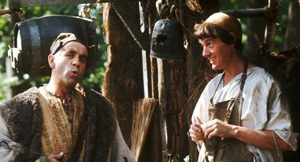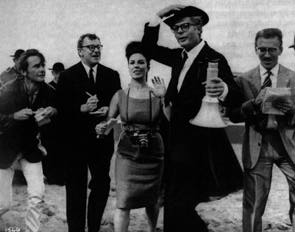
On this page, there is an article by Terry Gilliam, originally published in the September/October issue of Film Comment, called Terry Gilliam’s Guilty Pleasures. Following that is what Terry Gilliam said to BBC2 about his very favourite movie moment. Finally, there are some lists that Gilliam has created summarising his favourite movies…
Terry Gilliam’s Guilty Pleasures
I’m like a bad witness in court. I don’t remember things. I don’t remember films. I remember the films that I really like, but not the ones I don’t; if I’ve suppressed them, I’ve done it incredibly successfully. Plus, guilty pleasures aren’t really guilty – I don’t feel guilty about any of them.
I was born in Minneapolis; we moved out to Los Angeles when I was 12. So I grew up in the San Fernando Valley. I can remember the serials from radio more than the serials from cinema. The Green Hornet, The Shadow, The Lone Ranger…. Radio was the real well of imagination, as far as I was concerned. It was just sounds. It was better than movies because I was allowed to put the images in; I could invent anything I wanted to go with those sounds.
There’s a script going around Hollywood for The Shadow. But it only works in radio – you know, “Lamont Cranston had learned in the mystic East the power to cloud men’s minds.” It wasn’t that he was like the Invisible Man; he could impose his mind on other people’s minds and block himself out as far as their vision was concerned. And so you’d be in a room and some villains are talking, and then you hear this sinister laugh – “Haha-haha!” Wait, somebody’s in here, what’s going on here? Did you hear something? “Haha-haha!” And then there would be a scuffle and somebody hits the ground – Jesus, what happened to Billy? – and always, finally: “Only the Shadow knows!”
There’s a side of me that always fell for manic things, frenzied, cartoony performances. I always liked sideshows, freakshows – words we don’t use these days. Jerry Lewis was a freakshow. It was pushing things right back to music hall or burlesque. Dean Martin and Jerry Lewis used to make me howl. Howl. Absolutely grotesque, awful stuff. Tasteless. But I like things to be tasteless. And I think that’s useful, because you reach a certain point where you start “appreciating” films and then are allowed a certain precious form of tastelessness: if it’s camp enough, it’s all right. But that’s simply inverted sophistication, intellectual snobbery. The real tasteless stuff… Jerry Lewis is funny because he’s funny, because he’s grotesque, leaping around the place, making funny voices, doing funny things.
Fred MacMurray always made me laugh – the Flubber series. I love Fred MacMurray. He’s wonderfully funny, a great performer. I remember MacMurray most in The Apartment; he was the slime. He was so smooth, so charming, so distasteful. The strange thing is, I never thought I was interested in actors as such, and acting, but when I look back… I mean, when it really comes down to it: Fred MacMurray, Rock Hudson, Doris Day.
I used to like Doris Day and Rock Hudson because their movies were actually good comedies. The subject matter was shit, but the comedy was played well. I didn’t realize at the time they were good performances, but they are. It was good light comedy.
The same applies to Burt Reynolds, who’s been given a rather hard time. Reynolds is a wonderful light comic actor. Brilliant. But many people didn’t recognize that, because he was doing his ole-boy accent. What they weren’t watching was what he was actually doing: his delivery and his timing, the facility with which he handled the stuff lightly and yet funnily. It’s basically Cary Grant he’s doing. Except he’s got the wrong accent.
Smokey and the Bandit is not bad. The Smokeys are jokey films and I don’t get much long-term thrill out of that, but what I do remember are performances and ways of doing things. The subject matter’s useless, but you get caught in this syndrome that things have to have meaning and weight to be good. And they don’t. The Silence of the Lambs is a case in point. I think it gives the impression of being about something, but what it basically gives you is a couple of good thrills and spills and a great monster.
I was a great fan of Walt Disney. Everything Disney did, I fell for: the live-action stuff – 20,000 Leagues Under the Sea, Treasure Island; all the cartoons, Pinocchio. As far as other animation, Mr. Magoo was good. I never knew who the other great animators were, despite watching their cartoons. Even after I was in Python, I never knew who Chuck Jones was. Or Tex Avery. They represented a shift from Disney, but in all of them there is the creation of these amazing worlds. That’s what Disney always did.
And that’s what always surprised me, when I’d go and see a Rock Hudson – Doris Day comedy. In a sense I hated it, because it was domestic – it was about the same world I was living in – and yet I’d find I was laughing more than I should, and secretly enjoying it. I think was too naive. That’s why I don’t feel guilty about it now: I didn’t know better the time. I wasn’t wise in the ways of movies, I just liked them.
And then going to college, when I discovered more serious films, then my old favorites were an embarrassment to me. Then I spent my whole time trying to get away from Disney. That’s why my cartoons were like that: I was going in the opposite direction, away from everything that Disney stood for. And the awful thing is, I love those things.
But you end up coming out of all that. When you cross Fellini and Kurosawa with Doris Day and Fred MacMurray and Rock Hudson, you get what I do.
Mary Poppins I really liked. Terrific songs. That side of Disney – when it’s ingenuous, it’s really magical and delightful – and she’s actually saying interesting things. Everything I’ve done has come from the song, “A spoonful of sugar helps the medicine go down” All my films have good funny bits, but then there are all these other things that disturb or get to you. The trick is, you coat those moments, which are the moments I’m really interested in, with all the sugar – the silly things, and the spectacular things – to get people in and interested enough to get this other, the more bitter pill, thrust down them. Julie said it all.
Julie Andrews I think is very good. The film of hers I like most is The Americanization of Emily, with James Garner. It’s a wonderful film, and she’s great! Because she’s really sexy in the thing, she’s this English rose, but like most Englishwomen, underneath that cool, prim, ordered exterior is something sexy. I think that may have sent me off to England in ’67. I actually met Julie Andrews once. And I thought she was one of the sexiest women I’d ever met. Interesting sexy. Not like Raquel Welch – it’s more subtle, because it’s not displayed. But it’s there. For the perceptive, it’s there.
There’s a whole string of romantic films I was crazy about. I was always falling for Wuthering Heights kind of films, and Rebecca and The Red Shoes. They tend to be lush period pieces with lots of old stylized passion running around the place. I think my films are always very romantic. Nobody else does, but I mean, with Munchausen waltzing like that in the air, there’s no justification for it other than just gushing old-fashioned romanticism. So I slip that one through while they think I’m doing some very hard-biting comedies.
I’m a real sucker for all the great epics – Ben-Hur, The Ten Commandments, all the Cecil B. DeMille films, even The Fall of the Roman Empire and the Hercules movies. It’s sort of the breeding ground for megalomania, that kind of film. Anything that had to do with creating another world on a grand scale was always just amazing.
Sam Peckinpah’s Ride the High Country – love that – and The Wild Bunch. Because they’re great romantic pieces about people whom time has passed, people who are set in their ways and it’s too late to change. They can’t adapt, and ultimately they die. That’s dealing with things on a very high mythic level.
I didn’t have a great memory of Forbidden Planet. When I saw it again – because somebody’s trying to remake it – I realized why. It’s not a good movie. Robbie the Robot’s all right; I liked the beginning – and then they just got very static. I thought it was so fucking stupid. What it does is, maybe, tell us what times were like in the Fifties, how naive people were about psychiatry – the Monster from the Id! I just started giggling at that point. It would have been more interesting to have the Monster from the Libido – the X-rated version of Forbidden Planet! “What’s he knocking that door down with?” That was the nice thing about Alien – that wonderful mixture of writhing sexual imagery and totally violent, awful stuff. That works because it’s not spelled out. It’s working subconsciously.
Animals: I fall for animals – where the dog comes running up panting and lands in the kid’s lap and they hug each other. I hate myself for it. I saw the display for The Incredible Journey in Tokyo; it was called The Adventures of Shakra, I think, in Japan. There were these great cut-out birch trees outside the cinema, and this giant head of a cat. It had gone from something cute and cuddly to something gigantic and bizarre. Quite wonderful, actually, because it was so tasteless, so horrendous – and people were rushing in to see it.
But it comes back to freakshows. They don’t exist anymore. When the circus used to come to town, there’d be the menagerie sideshow and then there’d be the freakshow. I remember Clyde Beatty’s Circus; all of us kids would go out to help raise the tents to get some money and free tickets. My job was raising the tent for the freakshow. I’d go in there and see the fat lady, the pinheads, the rubber man – all playing cards, completely normal people. I loved Tod Browning’s Freaks – one of those films you know about for a long time and finally stumble on. It wasn’t quite as good as I had imagined it would be, but the element that’s so wonderful is to take the abnormal and make it, basically, normal. And that’s what was happening when I was raising circus tents.
It eventually blossomed in Time Bandits, where you take those guys and don’t treat them like dwarves, like little people – you treat them like Alan Ladd, who was… oh, no, that’s the same thing, sorry. But if he can be a hero, why can’t they?, was my attitude; and so I just treated them like 6-foot-1 people, and asked them to do the exact same thing. Nobody’d ever asked them to do that in their lives.
One-Eyed Jacks is one of my favorite films of all time. Number one: spectacular performances. And a great script: the idea of the thing was great. It was really a character piece, and every character was breathtakingly wonderful. The casting was amazing, the costumes were great, the dialogue was fucking wonderful. Particularly “You great gob of spit!”
It was truly mythic as well, that one. And the sense of contrasts: this great bulk of Brando there, and the girl, Pina Pellicer, the most delicate creature you’ve ever seen. And then Karl Malden and Katy Jurado and Ben Johnson.
Great masochist too, Brando. He obviously had this Christ complex, because the whipping scene is a crucifixion. And what better but to be beaten by your best friend? The real evil, the real bad guy in Brazil, is the best friend. I’m sure that’s coming from One-Eyed Jacks, because that was the first time I really felt that idea. It stuck with me. And that’s what’s so awful: Michael Palin in Brazil is funny, he’s charming, and yet the choices that character makes are totally horrendous.
One-Eyed Jacks was phenomenal. I think I watched it three times in a row. When the film came out, I didn’t have any money and so I had to go to one of those shitty little 42nd Street theaters. And I just sat there all day. It was on a double bill, and I had to sit through the other film each time.
Brando was raked over the coals critically about One-Eyed Jacks, because he was doing things only David Lean should get away with. He was waiting for the surf to crash, waiting for the waves to get from 7-foot high to 20-foot high. In those scenes where they ride along the edge of the cliff and we see those great waves – David Lean can do it, but Marlon Brando, this actor, taking over and trying to direct the film, he’s not allowed to do that.
Maybe that’s Guilty Pleasures for me: “You’re not allowed to do that.” But some movies just say, “Oh, yeah?”
BBC2’s Close Up
Close Up is a program on BBC2 where celebrities are asked to choose their favourite cinematic moment. For the edition broadcast on 27 November 1995, Terry Gilliam was the guest. The transcript of what he said is below…
Because I have to choose, I chose Fellini’s 8 1/2. I don’t like having to choose because I hate reducing all of my filming experience to one film. But 8 1/2 somehow coalesces for me in many ways the essence of cinema and in particular the sequence that I have chosen is Marcello Mastroianno passing down the hallways of the hotel where they’re trying to make this movie, and he has this phenomenal ability to tap dance his way out of trouble and when I saw that, it was long before I ever made a movie, but I suspected there was truth to that and subsequently now having made a few movies, I know it’s the ultimate truth of movie making, and the job of the director is to tap dance past all the problems.
I was 23. Kennedy was planning to get assassinated. I was in New York. I’d left college and this film came on and I’d always been a Fellini fan, but something about 8 1/2, it just got under my skin. Creativity is really what it’s about. It just happens to be about a movie director. It’s about the process of trying to make something and knowing you don’t know how to make it, and everybody waiting for you to come up with the solution. He is stalling. He is dealing with producers and money problems. It’s really just this juggling back and forth while his whole life is disintegrating and him remembering bits of it and the fact that the film then spreads right back through his life, through his dreams, through the relationship with his parents, everything is what’s so wonderful about it. It uses that and it uses the past, the future, the present and it uses dreams – all the things that I’ve used in my films in different ways.
Most people want to think life has got some structure, form and that you can distinguish the past from the future, and the present. I don’t think it’s true, I think Fellini admits to that and allows all of these things to enter into the process. Faces always coming at you – he’s got the money, he’s got everything, but he doesn’t know what he’s doing and everyone’s coming at him. They’re all wanting answers. They’re all wanting something from him. I think one of the first times I was really aware of the camera as a partner in dance, because I think the film is like a dance. He shoots like a dancer would shoot. It’s all moving, it’s shifting. Things are coming in and out of frame. It’s never still. It’s what life always seems like to me. It always feels like the passage through life.
I don’t know. I think Fellini just told me things about my future. He told me about the process of life. He told me things about the process of life. He told me things about memory that all seems true and honest and believable, even though he lies the whole time. That’s what I love about Fellini, he’s a liar. He’s a constant liar. He twists and distorts the truth.
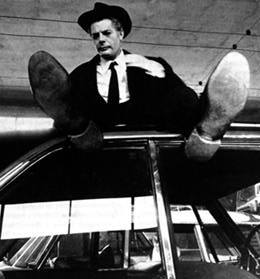 Now whether any of us saw the world like Fellini showed us until he actually made his films I don’t know. I have that terrible feeling he opened our eyes to a world that was sitting there all alone. Those of us who followed could come and see the world that he saw.
Now whether any of us saw the world like Fellini showed us until he actually made his films I don’t know. I have that terrible feeling he opened our eyes to a world that was sitting there all alone. Those of us who followed could come and see the world that he saw.
Mastroianni – I mean I just – from the moment I saw him I thought – wouldn’t it be nice to be Mastroianni, and even Fellini had the same feeling – wouldn’t it be nice to be Mastroianni, and so he got him in to be Fellini in all his movies. I mean not only was he handsome, but he was tired of life at an early age. He was romantic. He was weak. He vacillated. All the things that I didn’t want to be, and probably would’ve ended up being.
I think when I saw it, my reading of it was that the auteur existed. I mean there was the director – the Fellini character – played by Marcello who they’re all looking to for the answers. They’re all doing their jobs, but the centre man, the one who makes the decisions ultimately is the director. And maybe that’s why I wanted to become a director. I wanted to be that person that they all came to for answers.
Once you become a director you realise that’s the last thing you want because you don’t have the answers, and they all think you do. I’m convinced films don’t need directors to be made. I think that they need somebody who pretends to be the director so that they can all go and blame them for everything and not get the answers they need so they get on and do their job as best they can. Films can be made that way. The director is more of a myth than anything else and I’m happy to be part of that mythology.
Terry Gilliam’s Top 10 Movies
I know of two occasions when Terry Gilliam has provided a list of his favourite movies. In the UK’s Sight and Sound magazine in January 1994, he gave the following top 10 movies (in no order of preference):
- Citizen Kane (Welles)
- Seven Samurai (Kurosawa)
- Seventh Seal (Bergman)
- 8 1/2 (Fellini)
- 2001: A Space Odyssey (Kubrick)
- Sherlock Jr (Keaton)
- Pinocchio (Sharpsteen/Luske)
- Les Enfants du Paradis (Carne)
- One-Eyed Jacks (Brando)
- The Apartment (Wilder)
In London’s Time Out in May 1995, he stated the following (again in no order of preference):
- Citizen Kane (Welles)
- 8 1/2 (Fellini)
- Pinocchio (Sharpsteen/Luske)
- The Seventh Seal (Bergman)
- Seven Samurai (Kurosawa)
- Napoleon (Gance)
- Birth of a Nation (Griffiths)
- Sherlock Junior (Keaton)
- The Exterminating Angel (Bunuel)
- Lawrence of Arabia (Lean)


